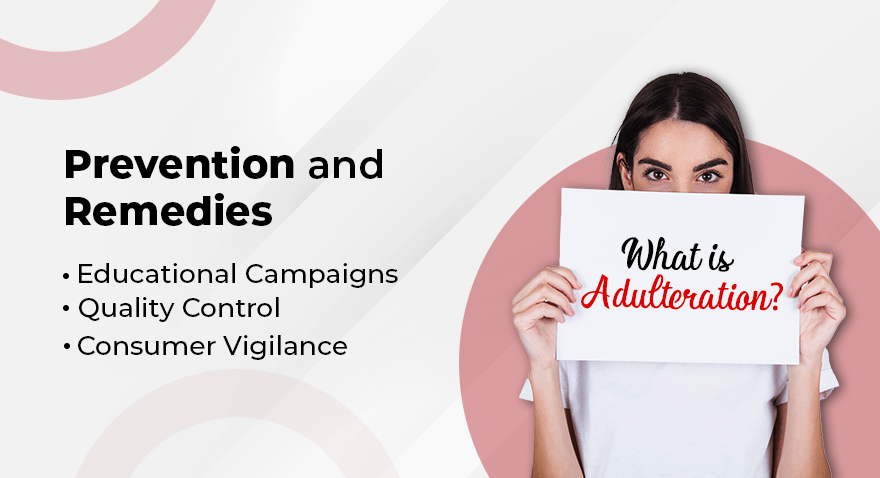Food Adulteration and its Impact on Nutrition
In our fast-moving world, where convenience often takes precedence over quality, the purity of our food is sometimes compromised. Food adulteration, the practice of adding cheaper or harmful substances to food, has become a widespread issue in the food industry. This sneaky practice not only threatens our health but also contributes to the rise of nutrient deficiencies among populations worldwide.
Understanding Food Adulteration
Food adulteration happens when things are mixed into food to make it look like there’s more or to make it last longer on shelves. Sometimes, these added things are not good for us, like chemicals or dyes. They’re cheaper than the real ingredients but can cause harm.
This can mess up our health by making us lack important nutrients, making us sick, or even causing long-term health problems. It’s like pretending to be healthy food, but it’s not. That’s why it’s important to be careful about what we eat and make sure our food is real and safe.
Common Types of Food Adulteration
Imagine this: you pour yourself a glass of refreshing juice, expecting a burst of natural flavour and nutrients. But what if that juice isn’t as pure as it seems? Food adulteration, a sneaky practice that’s more common than you might think, comes in various forms.

Here are some of the most common types:
- Dilution with Water: Adding water to milk, juices, and other beverages to increase quantity and profits.
- Ingredient Substitution: Using lower-quality ingredients instead of genuine ones. For example, using vegetable oils instead of pure olive oil.
- Chemical Additives: Incorporating synthetic chemicals like pesticides, fertilizers, or artificial colors to improve appearance or preserve freshness.
- Incorrect labeling: Incorrectly labeled food products to deceive consumers about their quality or origin.
How Food Adulteration Leads to Deficiencies
Food adulteration doesn’t just affect the taste and quality of what we eat; it can also have serious implications for our health.
Here’s how it contributes to nutrient deficiencies:
Reduced Nutrient Content: Adulterants often lack essential nutrients present in genuine food ingredients. Consuming adulterated products can result in inadequate intake of vitamins, minerals, and other vital nutrients, leading to deficiencies over time.
Toxic Exposure: Some adulterants contain toxic substances that pose health risks when consumed. Prolonged exposure to these toxins can harm organ function and hinder nutrient absorption, worsening deficiencies.
Dietary Imbalance: Adulterated foods may disrupt the nutrient balance in our diet. For instance, consuming adulterated cooking oils high in trans fats can elevate the risk of cardiovascular diseases and interfere with the absorption of fat-soluble vitamins like Vitamin D, A, E, and K.
Digestive Disruption: Adulterants such as artificial colors, flavours, and preservatives can disrupt the digestive process, leading to poor nutrient absorption. This can result in deficiencies despite consuming an adequate diet.
Impact of Food Adulteration on Public Health
Food adulteration doesn’t just affect the taste or appearance of our food; it also has serious implications for public health.

Let’s take a closer look at how the adulteration of food impacts our well-being:
Malnutrition: Adulterated foods often lack essential nutrients, contributing to malnutrition and its associated health problems, particularly among vulnerable groups such as children, pregnant women, and the elderly.
Increased Disease Risk: Consumption of adulterated food products can elevate the risk of foodborne illnesses, allergies, and chronic diseases due to exposure to harmful chemicals and pathogens.
Economic Burden: Treating health conditions arising from food adulteration places a considerable economic burden on individuals, families, and healthcare systems. Moreover, productivity losses due to illness further strain economies.
Lack of Trust: Food adulteration undermines consumer trust in the food industry and regulatory authorities. This loss of trust can lead to decreased confidence in food products and reluctance to purchase essential items, worsening food insecurity.
Prevention and Remedies
Addressing the issue of food adulteration requires concerted efforts from various stakeholders, including governments, regulatory agencies, food producers, and consumers.

Here are some measures that can help mitigate the problem:
Enforcement of Regulations:
Governments should enact and rigorously enforce regulations to prevent food adulteration. Regular monitoring and inspection of food production and distribution processes are essential to ensure compliance with safety standards.
Educational Campaigns:
Educating consumers about the risks of food adulteration and how to identify adulterated products empowers them to make informed choices. Public awareness campaigns through various media channels can play a crucial role in this regard.
Quality Control:
Food producers should implement robust quality control measures throughout the supply chain to detect and prevent adulteration. Utilizing advanced testing technologies and adhering to good manufacturing practices are key steps in maintaining food integrity.
Support for Local Producers:
Supporting small-scale farmers and producers can promote sustainable agricultural practices and reduce dependence on industrial food processing, where adulteration is more common.
Consumer Vigilance:
Consumers should carefully read food labels, purchase products from reputable sources, and report any suspicions of adulteration to relevant authorities. By staying vigilant, consumers can contribute to safeguarding the integrity of the food supply.
Conclusion
Food adulteration poses a significant threat to public health, leading to nutrient deficiencies and other adverse health outcomes. Addressing this complex issue requires collaborative efforts at the global, national, and community levels. By implementing strict regulations, raising public awareness, and promoting transparency in the food industry, we can protect consumers from the harms of food adulteration and ensure access to safe, nutritious food for all. Let’s work together to safeguard the integrity of our food supply and promote a healthier future for generations to come.

